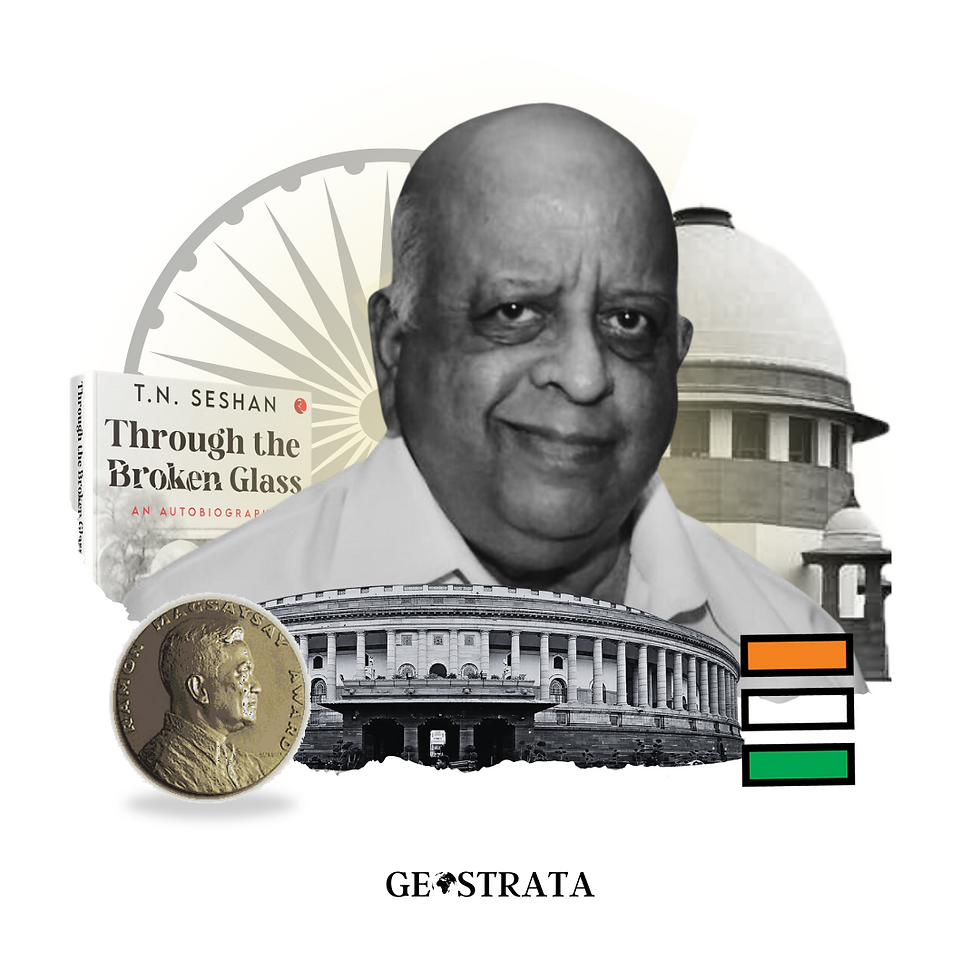“There have been numerous CECs [Chief Election Commissioners] and T N Seshan
happens once in a while.” ~ Supreme Court of India
The election festival in India has begun in India with much enthusiasm. As per the constitutional structure of India, it is the responsibility of the Election Commission of India to conduct free and fair elections for the Parliament and the state assemblies. As of now, the Election Commission consists of one Chief Election Commissioner (CEC) and two Election Commissioners who are entrusted with such a responsibility.

Illustration by The Geostrata
Rarely comes anyone at the stature of T. N. Seshan, when we think of the constitutional post of the CEC, who has fundamentally changed the nature and methods in which elections were being conducted in independent India. At the onset of the election in the world’s largest democracy, it is worth exploring the life and times of T. N. Seshan. “Through the Broken Glass: An Autobiography,” published last year by Rupa Publications, provides an interesting read on the same.
Divided in 23 chapters, the book provides insights into his life from his childhood to the end of his tenure as a CEC in December 1996. Inter alia, the book explored how he was perplexed to decide whether to join the IAS or the IPS after clearing both of those exams, how he took decisions as a DM in a politically charged environment, how he confronted his seniors in the secretariat on matters of principle, and how he took major decisions as a Cabinet Secretary and later as a CEC of India.
Throughout the book, Mr. Seshan’s grappling with his political and bureaucratic masters is clearly visible. One such incident involves the then-CM of Madras State and Congress stalwart K Kamaraj.
In May 1957, the author was appointed as a sub-collector in Dindigul, which was his first job with an independent charge. As one of his first orders, when a case came in front of him for a criminal misappropriation of Rs 3000 by a village officer, he ordered a criminal investigation into the matter.
It turns out the village officer’s wife was the head of the Palani taluk Congress committee, and if any action was to be taken against him, the higher political echelons might resist it. Without worrying about any political implications, following the law, Mr. Seshan ordered the suspension and subsequent arrest of the village officer. Local Congress leaders opposed such actions and tried to persuade the sub-collector by means of political muscle; however, he refused to yield his ground since he was just following the law.
A week after this incident, P. Kakkan, a minister in K. Kamaraj’s government, was visiting Dindigul. During that visit, he instructed Mr. Seshan to withdraw the complaint against the village officer. “It is true that you are the minister. But to take back the police case, you need to send me a written order after you go back to Madras. I will definitely take back the case then,” Mr. Seshan replied firmly, following which the minister behaved badly with him. Three days after this incident, CM Kamaraj came to Dindigul and found out about his ministers misbehaving with a civil servant. CM Kamaraj scolded the minister for his unruly behaviour, saying, “If government officers are humiliated, the government is humiliated.”
This incident shows not only his integrity towards the rule of law but also his courage to raise a voice against what is wrong, irrespective of political pressure. The book consists of many such incidents.
Source: Rupa Publications
During his tenure as a CEC, he single-handedly rejuvenated the constitutional institution, which, in a way, had been reduced to becoming another department of the government. Citing constitutional and statutory provisions, Mr. Seshan made sure that the institution of the Election Commission regained its operational and functional autonomy and made sure that free and fair elections, which is one of the cardinal principles of democracy, were being conducted properly.
In doing so, he not only had to fight with the government of the day but also with the judiciary on multiple occasions. Due to such, he became perhaps one of the few constitutional authorities in India against whom multiple impeachment motions were considered and tabled in Parliament.
From the implementation of the Model Code of Conduct (MCC) to the updating of electoral rolls and from curbing spending of illegal money during the election to the introduction of voter ID cards, Mr. Seshan initiated many electoral reforms, which are still in existence today, in 2024. In the concluding chapter summarising his career and life, he writes, “As I look back on my life and career, all that I can think and say is, ‘Life has been great—stormy, but great!’”
The induction of anecdotes, along with official orders and communications, makes it an interesting read for anyone enthusiastic about elections in India and making it one of the must-read books before the culmination of 2024 general election.
BY DARSHAN GAJJAR
TEAM GEOSTRATA
.png)

the man who revolutionised Indian elections